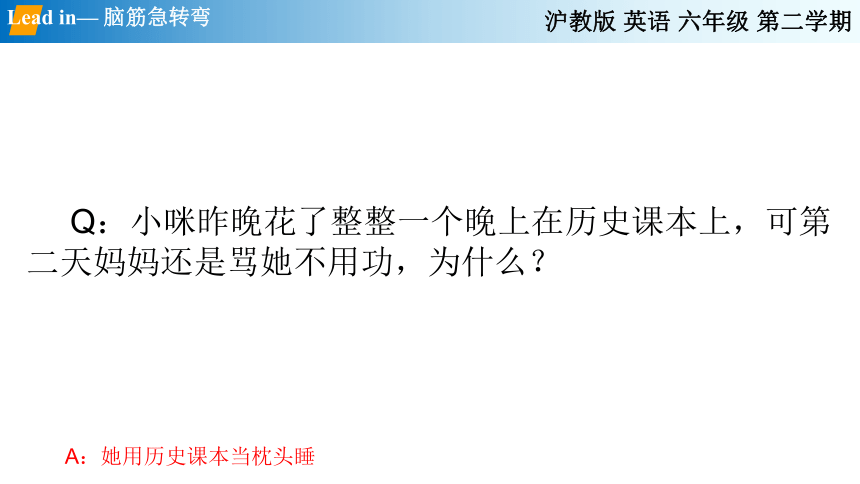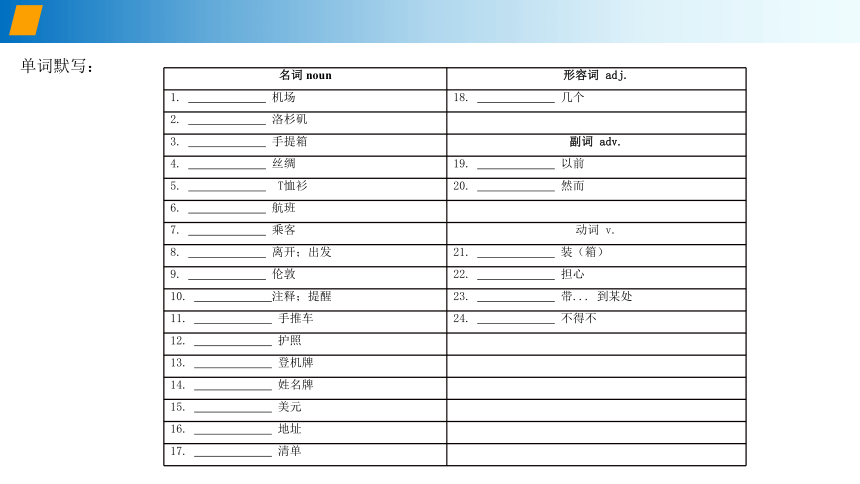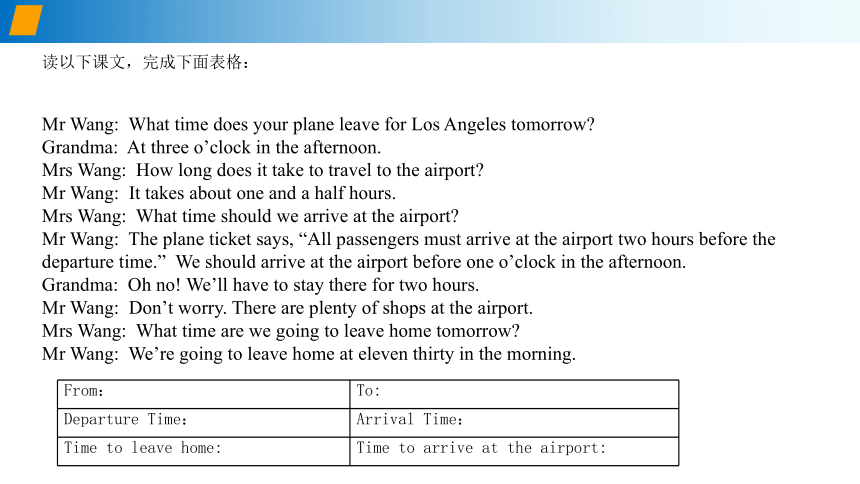Unit 2 At the airport 第2课时 语法知识及拓展(课件)-2021-2022学年六年级英语下册同步备课系列(牛津上海版)
文档属性
| 名称 | Unit 2 At the airport 第2课时 语法知识及拓展(课件)-2021-2022学年六年级英语下册同步备课系列(牛津上海版) |  | |
| 格式 | pptx | ||
| 文件大小 | 673.4KB | ||
| 资源类型 | 试卷 | ||
| 版本资源 | 牛津上海版(试用本) | ||
| 科目 | 英语 | ||
| 更新时间 | 2022-02-17 17:27:31 | ||
图片预览







文档简介
(共16张PPT)
Lead in— 脑筋急转弯
Q:小咪昨晚花了整整一个晚上在历史课本上,可第二天妈妈还是骂她不用功,为什么?
A:她用历史课本当枕头睡
沪教版 英语 六年级 第二学期
Snow and Ice Knowledge 冰雪知识
Figure Skating
花样滑冰
金博洋
中国花样滑冰运动员
沪教版 英语 六年级 第二学期
一、课前回顾
单词默写:
名词 noun 形容词 adj.
1. 机场 18. 几个
2. 洛杉矶
3. 手提箱 副词 adv.
4. 丝绸 19. 以前
5. T恤衫 20. 然而
6. 航班
7. 乘客 动词 v.
8. 离开;出发 21. 装(箱)
9. 伦敦 22. 担心
10. 注释;提醒 23. 带... 到某处
11. 手推车 24. 不得不
12. 护照
13. 登机牌
14. 姓名牌
15. 美元
16. 地址
17. 清单
二、新课导入
读以下课文,完成下面表格:
Mr Wang: What time does your plane leave for Los Angeles tomorrow
Grandma: At three o’clock in the afternoon.
Mrs Wang: How long does it take to travel to the airport
Mr Wang: It takes about one and a half hours.
Mrs Wang: What time should we arrive at the airport
Mr Wang: The plane ticket says, “All passengers must arrive at the airport two hours before the departure time.” We should arrive at the airport before one o’clock in the afternoon.
Grandma: Oh no! We’ll have to stay there for two hours.
Mr Wang: Don’t worry. There are plenty of shops at the airport.
Mrs Wang: What time are we going to leave home tomorrow
Mr Wang: We’re going to leave home at eleven thirty in the morning.
From: To:
Departure Time: Arrival Time:
Time to leave home: Time to arrive at the airport:
三、新课讲解
(一)现在完成时的构成
现在完成时由“助动词have/has+动词的过去分词”构成。现以动词work为例,将其肯定式、否定式、疑问式及简略答语列表如下:
肯定式 否定式 I/You have worked.He/She/It has worked.We/You/They have worked. I/You have not worked.He/She/It has not worked.We/You/They have not worked. 疑问式 简略答语 Have I/you worked Has he/she/it worked Have we/you/they worked Yes, you/I have.Yes, he/she/it has.Yes, you/we/they have. No, you/I have not.No, he/she/it has not. No, you/we/they have not.
【友情提示】规则动词的过去分词的构成与过去式相同。不规则动词的过去分词则要特殊记忆。have not常简缩为haven't,has not常简缩为hasn't。
(二)现在完成时的用法
1. 表示过去发生或已经完成的某一动作对现在造成的影响或结果。
e. g. -Have you had your lunch yet 你吃午饭了吗?
-Yes, I have. I've just had it. 是的,我刚吃过。
I have already posted the photos. 我已经把这些照片寄出去了。(这些照片已不在我这里了)
I have already seen the film. 我已经看过这部电影了。(了解了电影的内容)
2. 表示过去已经开始,持续到现在的动作或状态,可以和表示从过去某一时刻延续到现在包括现在在内的一段时间连用。表示持续动作状态的动词多是延续性动词。
e. g. We have known each other for 3 years.我们彼此已经认识三年了。
I've been at this school for over 2 years.我已经在这所学校呆了两年多了。
They have lived here since 1996.他们自从1996年就居住在这里了。
How long have you taught at this school 你在这所学校教书有多久了?
She has taught us since I came to this school.自从我来这所学校她就教我们。
(三)与现在完成时连用的常用副词
现在完成时常与already(已经),ever(曾经),never(从来不),just(刚刚),before(以前),yet(已经;仍然)等副词连用。
e. g. Have you ever made dumplings 你包过饺子吗?
I've just lost my English book.我刚刚把我的英语书弄丢了。
I've never been to that farm before.我以前从未去过那家农场。
I haven't learned the text yet. 我还没有学那篇课文。
(四)现在完成时态中应注意的问题
1. 点动词与延续性动词的区别
(1)所谓点动词是指含有终止或短暂意义的动词。如:begin, end, die, buy, borrow, come, arrive, join, marry等动词。它们通常不与表示一段时间的状语连用。
e. g. I have bought a book.我买了一本书。
I've had this book for three weeks.这本书我已经买了三个星期了。
(2)某些非延续性动词可以与since连用,表示重复的动作或状态。
e. g. I have met her often since I moved here.自从我搬到这儿,我经常遇见她。
They have gone fishing five times since last spring.自从去年春天以来,他们已钓了5次鱼了。
(3)有些非延续性动词的现在完成时在否定结构中可以与since或for短语连用。
e. g. He has never touched beer for a whole week.他整个星期都滴酒未沾。
I haven’t bought anything for a year.一年来我什么都没买。
2. has been to和has gone to的区别
has been to表示“曾经去过”,说明所提及的对象已回到说话地点。
has gone to表示“去……”,说明所提及的对象不在说话地点。
e. g. I've been to Beijing for many times. 我到过北京很多次了。
Tom has gone to Beijing and will come back next week.汤姆已到北京去了,下星期才回来。
I. Choose the most proper answer.
( ) 1. There are flowers in the garden.
A. not B. not many C. not much D. not a lot of
( ) 2. We need to practice English every day.
A. read B. reading C. to read D. have read
( ) 3. is an indoor activity.
A. Going on a picnic B. Playing football
C. Playing the piano D. Playing badminton
( ) 4. A: do you watch TV B: Twice a week.
A. How long B. How soon C. How far D. How often
( ) 5. Don't forget a trolley when you are in a supermarket.
A. taking B. take C. to take D. taken
( ) 6. Mary often helps her mother some housework.
A. doing B. do C. did D. have done
( ) 7. I play piano very well, but I can't play tennis.
A. the, the B. a, a C. the, / D. /, the
( ) 8. Mr. Grey was born May 1, 1998.
A. of B. in C. on D. at
( ) 9. I'd rather when I have enough time.
A. go shopping B. to go shopping
C. went shopping D. going shopping
( ) 10. There are people in the hall.
A. two hundred B. two hundreds C. hundred of D. two hundreds of
( ) 11. Heilongjiang is the northeast of China.
A. in B. of C. to D. from
( ) 12. I like coffee sugar.
A. about B. for C. with D. on
( ) 13. A: Who you English this term B: Mrs. Black is.
A. teach B. teaches
C. is going to teach D. is teach
( ) 14. Do you feel Enough sleep is for your health.
A. good, good B. good, well C. well, good D. well, well
( ) 15. What about a picnic tomorrow
A. go to B. going to C. go on D. going on
【keys】
I. l-5 BBCDC 6-10 BCCAA 11-15 ACBCB
愿君皆有所获,皆有所得
Lead in— 脑筋急转弯
Q:小咪昨晚花了整整一个晚上在历史课本上,可第二天妈妈还是骂她不用功,为什么?
A:她用历史课本当枕头睡
沪教版 英语 六年级 第二学期
Snow and Ice Knowledge 冰雪知识
Figure Skating
花样滑冰
金博洋
中国花样滑冰运动员
沪教版 英语 六年级 第二学期
一、课前回顾
单词默写:
名词 noun 形容词 adj.
1. 机场 18. 几个
2. 洛杉矶
3. 手提箱 副词 adv.
4. 丝绸 19. 以前
5. T恤衫 20. 然而
6. 航班
7. 乘客 动词 v.
8. 离开;出发 21. 装(箱)
9. 伦敦 22. 担心
10. 注释;提醒 23. 带... 到某处
11. 手推车 24. 不得不
12. 护照
13. 登机牌
14. 姓名牌
15. 美元
16. 地址
17. 清单
二、新课导入
读以下课文,完成下面表格:
Mr Wang: What time does your plane leave for Los Angeles tomorrow
Grandma: At three o’clock in the afternoon.
Mrs Wang: How long does it take to travel to the airport
Mr Wang: It takes about one and a half hours.
Mrs Wang: What time should we arrive at the airport
Mr Wang: The plane ticket says, “All passengers must arrive at the airport two hours before the departure time.” We should arrive at the airport before one o’clock in the afternoon.
Grandma: Oh no! We’ll have to stay there for two hours.
Mr Wang: Don’t worry. There are plenty of shops at the airport.
Mrs Wang: What time are we going to leave home tomorrow
Mr Wang: We’re going to leave home at eleven thirty in the morning.
From: To:
Departure Time: Arrival Time:
Time to leave home: Time to arrive at the airport:
三、新课讲解
(一)现在完成时的构成
现在完成时由“助动词have/has+动词的过去分词”构成。现以动词work为例,将其肯定式、否定式、疑问式及简略答语列表如下:
肯定式 否定式 I/You have worked.He/She/It has worked.We/You/They have worked. I/You have not worked.He/She/It has not worked.We/You/They have not worked. 疑问式 简略答语 Have I/you worked Has he/she/it worked Have we/you/they worked Yes, you/I have.Yes, he/she/it has.Yes, you/we/they have. No, you/I have not.No, he/she/it has not. No, you/we/they have not.
【友情提示】规则动词的过去分词的构成与过去式相同。不规则动词的过去分词则要特殊记忆。have not常简缩为haven't,has not常简缩为hasn't。
(二)现在完成时的用法
1. 表示过去发生或已经完成的某一动作对现在造成的影响或结果。
e. g. -Have you had your lunch yet 你吃午饭了吗?
-Yes, I have. I've just had it. 是的,我刚吃过。
I have already posted the photos. 我已经把这些照片寄出去了。(这些照片已不在我这里了)
I have already seen the film. 我已经看过这部电影了。(了解了电影的内容)
2. 表示过去已经开始,持续到现在的动作或状态,可以和表示从过去某一时刻延续到现在包括现在在内的一段时间连用。表示持续动作状态的动词多是延续性动词。
e. g. We have known each other for 3 years.我们彼此已经认识三年了。
I've been at this school for over 2 years.我已经在这所学校呆了两年多了。
They have lived here since 1996.他们自从1996年就居住在这里了。
How long have you taught at this school 你在这所学校教书有多久了?
She has taught us since I came to this school.自从我来这所学校她就教我们。
(三)与现在完成时连用的常用副词
现在完成时常与already(已经),ever(曾经),never(从来不),just(刚刚),before(以前),yet(已经;仍然)等副词连用。
e. g. Have you ever made dumplings 你包过饺子吗?
I've just lost my English book.我刚刚把我的英语书弄丢了。
I've never been to that farm before.我以前从未去过那家农场。
I haven't learned the text yet. 我还没有学那篇课文。
(四)现在完成时态中应注意的问题
1. 点动词与延续性动词的区别
(1)所谓点动词是指含有终止或短暂意义的动词。如:begin, end, die, buy, borrow, come, arrive, join, marry等动词。它们通常不与表示一段时间的状语连用。
e. g. I have bought a book.我买了一本书。
I've had this book for three weeks.这本书我已经买了三个星期了。
(2)某些非延续性动词可以与since连用,表示重复的动作或状态。
e. g. I have met her often since I moved here.自从我搬到这儿,我经常遇见她。
They have gone fishing five times since last spring.自从去年春天以来,他们已钓了5次鱼了。
(3)有些非延续性动词的现在完成时在否定结构中可以与since或for短语连用。
e. g. He has never touched beer for a whole week.他整个星期都滴酒未沾。
I haven’t bought anything for a year.一年来我什么都没买。
2. has been to和has gone to的区别
has been to表示“曾经去过”,说明所提及的对象已回到说话地点。
has gone to表示“去……”,说明所提及的对象不在说话地点。
e. g. I've been to Beijing for many times. 我到过北京很多次了。
Tom has gone to Beijing and will come back next week.汤姆已到北京去了,下星期才回来。
I. Choose the most proper answer.
( ) 1. There are flowers in the garden.
A. not B. not many C. not much D. not a lot of
( ) 2. We need to practice English every day.
A. read B. reading C. to read D. have read
( ) 3. is an indoor activity.
A. Going on a picnic B. Playing football
C. Playing the piano D. Playing badminton
( ) 4. A: do you watch TV B: Twice a week.
A. How long B. How soon C. How far D. How often
( ) 5. Don't forget a trolley when you are in a supermarket.
A. taking B. take C. to take D. taken
( ) 6. Mary often helps her mother some housework.
A. doing B. do C. did D. have done
( ) 7. I play piano very well, but I can't play tennis.
A. the, the B. a, a C. the, / D. /, the
( ) 8. Mr. Grey was born May 1, 1998.
A. of B. in C. on D. at
( ) 9. I'd rather when I have enough time.
A. go shopping B. to go shopping
C. went shopping D. going shopping
( ) 10. There are people in the hall.
A. two hundred B. two hundreds C. hundred of D. two hundreds of
( ) 11. Heilongjiang is the northeast of China.
A. in B. of C. to D. from
( ) 12. I like coffee sugar.
A. about B. for C. with D. on
( ) 13. A: Who you English this term B: Mrs. Black is.
A. teach B. teaches
C. is going to teach D. is teach
( ) 14. Do you feel Enough sleep is for your health.
A. good, good B. good, well C. well, good D. well, well
( ) 15. What about a picnic tomorrow
A. go to B. going to C. go on D. going on
【keys】
I. l-5 BBCDC 6-10 BCCAA 11-15 ACBCB
愿君皆有所获,皆有所得
同课章节目录
- Module 1 City life
- Unit 1 Great cities in Asia
- Unit 2 At the airport
- Unit 3 Dragon Boat Festival
- Unit 4 Staying healthy
- Module 2 Changes
- Unit 5 What will I be like?
- Unit 6 Seasonal changes
- Unit 7 Travelling in Garden City
- Module 3 The nature world
- Unit 8 Windy weathe
- Unit 9 Sea water and rain wate
- Unit 10 Forests and land
- Unit 11 Controlling fire
